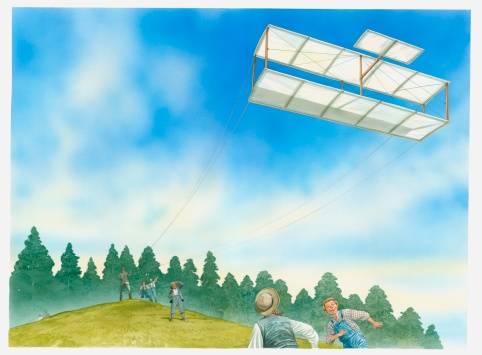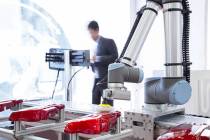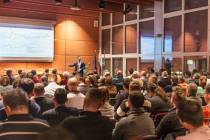If you’re going to fly, you’re going to fly
Saturday marked the 146th anniversary of the birth of Orville Wright. Yes, that Orville Wright, the younger brother of Wilbur. Yes, those Wright brothers, two men who changed the world and the history of it — no wait, the future of it — as dramatically, if not more, as anyone ever did.
I really like getting inspired by great stories — and theirs surely is a great one — so it was not by accident that I decided to pick up David McCullough’s book, “The Wright Brothers.” It’s not that I haven’t learned about them before this. Indeed I have and quite a bit, in fact, to the point where they are part of one of my lectures in one of my graduate leadership courses at Fairleigh Dickinson University.
But you can never get too much of a great thing, you know? So I’m off and reading more. That lecture, by the way, is about vision, belief in yourself and determination — all critical leadership traits.
In any event, this all got me to thinking: There’s a good career lesson here, too. If you’ve been reading this column for a while, you’ve seen plenty of these lessons here — in anecdotal but documented form — about important figures such as Nicolaus Copernicus, Albert Einstein, Niels Bohr, Marie Curie, Mohandas Gandhi, Sandy Koufax, M. C. Escher, Dwight Eisenhower, Ray Bradbury and so many more.
But there’s always room for more, so let’s talk about choosing careers, whether you’re at the start of your career or somewhere in the middle of it and considering a change. The decisions you make about this right now are all about the future, but it is disappointing that so many people pick careers without making connections to their futures.
The reasons for this are all over the place, and none of them hold water in the long run, like choosing high-paying occupations, doing something cool, going along with a sweeping trend, playing things safe, doing what others are doing, going in a particular direction because you just didn’t know what else to do or — worst of all — because others doubt you.
Whatever the case, there is an evident detachment from consideration of the future. Not that we can or even should be expected to know with certainty what the future will bring. However, knowing the future and believing in it are two different things.
What we can do, however, is to be prepared for the future by being avid in-takers of good information, and there’s no better way to do this than by reading. With that comes the high probability that we will develop a vision for ourselves that we can then turn into a passion, then a plan, and then action. Ultimately, that’s the idea.
The key word in all this is belief. So with little more for me to add, I hope the following anecdote, most of which very few people know, will resonate with anyone — and that should be everyone — thinking about their careers.
Two quick factoids, first. One, though Wilbur and Orville were extremely bright young men, Wilbur just finished high school and Orville never did. Two, the date they changed the world was Dec. 17, 1903. (Keep the date in mind.)
In 1902, Simon Newcomb, professor of mathematics and astronomy at Johns Hopkins University, said: “Flight by machines heavier than air is unpractical and insignificant, if not utterly impossible.”
Doubt like Newcomb’s was widespread. Even the greatest of all inventors, Thomas Edison, thought the effort to fly had been exhausted.
A year later, Orville and Wilbur made their first sustained flight of a powered, heavier-than-air machine, a 59-second journey of 120 feet at Kitty Hawk, North Carolina. It wasn’t their first attempt, but that never stopped them. That sub-one-minute flight changed the world forever. The brothers never doubted themselves. They flew.
Incredibly, the engineering editor of The Times of London said: “All attempts at artificial aviation are not only dangerous to human life but foredoomed to failure from the engineering standpoint.”
What was crazy about his statement? He made it more than two years after Orville and Wilbur flew. Some people can’t envision something before it’s happened. Some, sadly, can’t even understand it once it has happened.
But a vision, a belief in that vision and a determination to make that vision a reality can never be deterred by others who, for some reason or another, doubt you.
Let them doubt you. If you’re going to fly, you’re going to fly.
Career coach and corporate adviser Eli Amdur has been authoring his weekly “Career Coach” column since 2003 and is the author of the acclaimed career advice book “It’s Not So Far From Here to There: The thinking person’s guide to well-managed career”. Adjunct professor of two graduate-level leadership courses at Fairleigh Dickinson University in New Jersey, he is also active on the speaker circuit, delivering presentations on today’s critical employment and leadership issues. Visit his website at www.amdurcoaching.com.




























